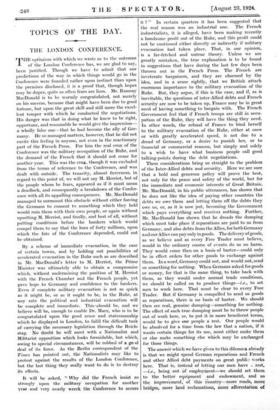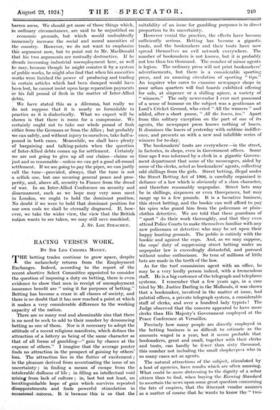TOPICS OF THE DAY.
THE LONDON CONFERENCE.
THFE optimism with which we wrote as to the outcome. of the London Conference has, we are glad to say, been justified. Though we have to admit that our predictions of the way in which things would go in the Conference were founded rather upon instinct than upon the premises disclosed, it is a proof that, though hopes may be dupes, quite as often fears are liars. Mr. Ramsay MacDonald is to be warmly congratulated, not merely on his success, because that might have been due to good fortune, but upon the great skill and still more the excel- lent temper with which he conducted the negotiations. His danger was that in doing what he knew to be right, opportune, and reasonable he would give the impression— a wholly false one—that he had become the ally of Ger- many. He so managed matters, however, that he did not excite this feeling in anyone, not even in the reactionary part of the French Press. For him the real crux of the Conference was the military occupation of the Ruhr, and the demand of the French that it should not cease for another year. This was the crux, though it was excluded from the terms of reference to the Conference, and was dealt with outside. The tenacity, almost fierceness, in regard to this point of, we will not say M. Herriot, but of the people whom he fears, appeared as if it must mean a deadlock, and consequently a breakdown of the Confer- ence with all its appalling consequences. Mr. MacDonald managed to surmount this obstacle without either forcing the Germans to consent to something which they held mould ruin them with their own people, or again without upsetting M. Herriot, and finally, and best of all, without putting conditions before the bankers which would compel them to say that the loan of forty millions, upon which the fate of the Conference depended, could not be obtained.
By a scheme of immediate evacuation, in the case of certain towns, and by holding out possibilities of accelerated evacuation in the Ruhr such as are described in Mr. MacDonald's letter to M. Herriot, the Prime Minister was ultimately able to obtain a compromise which, without undermining the position of M. Herriot with the French Chamber and the French people, yet gave hope to Germany and confidence to the bankers. Even if complete military evacuation is not as quick as it might be, or as it ought to be, in the Ruhr, at any rate the political and industrial evacuation will be complete and immediate. This ..should be, and we believe will 'be, enough to enable Dr. Marx; who is to be congratulated upon the good sense and statesmanship which he displayed in London, to fulfil the difficult task of. carrying the necessary legislation through the Reich- stag. No doubt he will meet with a Nationalist and Militarist opposition which looks formidable, but which, owing to special circumstances, will be robbed of a go xi deal of its force. As the Berlin correspondent of the Times has pointed out, the Nationalists may like to protest- -against the results of the London Conference, but the last thing they really want to do is to destroy its effects.
It will be asked, " Why did the French insist so strongly upon - the military occupation for another year and Very -nearly wreck the Conference to secure it ? " In certain quarters it has been suggested that the real reason was an industrial one. The French industrialists, it is alleged, have been making recently a handsome profit out of the Ruhr, and this profit could not be continued either directly or indirectly if military evacuation had taken place. That, in our opinion, is a far-fetched and untrue theory. Unless we are greatly mistaken, the true explanation is to be found in suggestions that have during the last few days been thrown out in the French Press. The French are inveterate bargainers, and they are obsessed by -the idea, and in a sense rightly, that we British attach enormous importance to the military evacuation of the Ruhr. But, they argue, if this is the case, and if, as is inevitable, the questions of inter-Allied debts and French security are now to be taken up, France may be in great need of having something to bargain with. The French Government feel that if French troops are still in occu- pation of the Ruhr, they will have the thing they need. In other words, the refusal of France to bind herself to the military evacuation of the Ruhr, either at once or with greatly accelerated speed, is not due to a dread of Germany, or a desire to punish her, or to financial or commercial reasons, but simply and solely to a wish to have what business people call good talking-points during the debt negotiations.
These considerations bring us straight to the problem of the Inter-Allied debts and security. Here we are sure that a bold and generous policy will prove the best; not only for the peace and safety of the world, but for the immediate and economic interests of Great Britain: Mr. MacDonald, in his public utterances, has shown that he does not like the idea of paying other countries, the debts we owe them and letting them off the debts they owe us, or, as it is now put, becoming the Government which pays everything and receives nothing. Further, Mr. MacDonald has shown that he dreads the dumping which must take place if reparations are paid to us from Germany, and also debts from the Allies, for both Germany and our Allies can pay only in goods. The delivery of goods, as we believe and as every Free Trader must believe, would in the ordinary course of events do us no harm. They would come then on a basis of barter—could only be in effect orders for other goods to exchange against them. In a word, Germany.could not, and would not, send us something for nothing. When Germans asked for goods or money, for that is the same thing, to take back with them, as they would, under normal trade conditions, we should be called on to produce things—i.e., to set men to work here. That must be clear to every Free Trader. But if Germany is compelled to send us goods as reparations, there is no basis of barter. We should then see real, genuine dumping—something for nothing. The effect of such true dumping must be to throw people out of work here, or, to put it in more beneficent terms, would be to give our people a rest. Our people would be absolved for a time from the law that a nation, if it wants certain things for its use, must either make them or else make something else which may be exchanged for those things. • The answer whiCh we have given to this dilenura already is that we might spend German reparations and French and other Allied debt payments on great publi2 works here. That is, instead: of letting our men have u rest, —i.e., being , out , of employinent—we should set them to the better equipment and endowment, and so the improvement; of this Fountry—more roads, more bridges; more land reclamations, more afforestation of barren areas. We should get more of those things which, in ordinary circumstances, are said to be unjustified on - economic grounds, but which - would undoubtedly immensely increase the social and • moral amenities of the country. However, we do not want to emphasize this argument now, but to point out to Mr. MacDonald that his two arguments are mutually destructive. If he dreads increasing. industrial unemployment here, as well he may, because though he might counter it by a system of public works, -he might alai find that when his amenities works were finished the pciWer of producing and trading in certain articles which had been dumped would have been lost, he cannot insist upon large reparation payments or his fiill pound Of flesh in the matter of Inter-Allied debts.
We have stated this as a dilemma; but really we "do not suppose that it is " nearly so formidable in practice as it is dialectically. What we expect will be shoWn is that' there is room for a compromise. We certainly ought not to take our whole pound of flesh either froth the Germans or from the Allies ; but probably We can safely, and without injury to ourselves, take half-a- pound in both cases. Meanwhile, we shall have plenty of bargaining and talking-points when the question of Inter-Allied debts comes up for settlement. Certainly we are not going to give up all our claims—claims so just and so reasonable—unless we can get a good all-round settlement. If we are going to pay the piper, we can justly call the . tune—provided, always, that the tune is not a selfish one, but one securing general peace and pros- perity, and, above all, security to France from the dread of war. In an Inter-Allied Conference on security and disarmament, such as we hope may very soon meet in London, we ought to hold the dominant position. No doubt if we were.to• hold that dominant position for our own ends we shall be eternally disgraced. If, how- ever, we take the wider view, the view that the British nation wants to see taken, we may still save mankind.
J. ST. LOB STRACHEY.



































 Previous page
Previous page